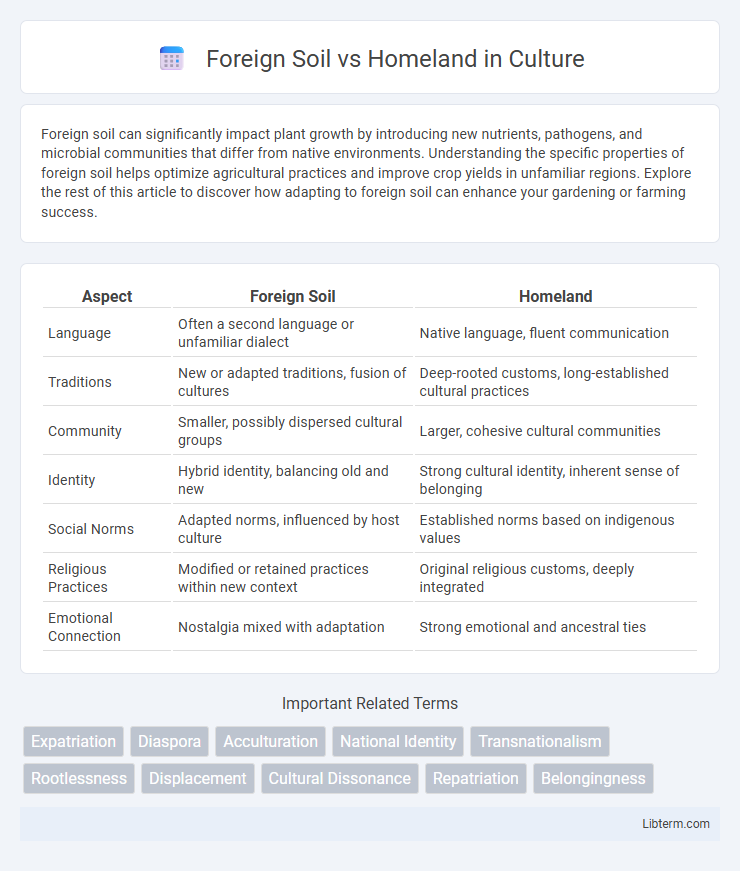Foreign soil can significantly impact plant growth by introducing new nutrients, pathogens, and microbial communities that differ from native environments. Understanding the specific properties of foreign soil helps optimize agricultural practices and improve crop yields in unfamiliar regions. Explore the rest of this article to discover how adapting to foreign soil can enhance your gardening or farming success.
Table of Comparison
| Aspect | Foreign Soil | Homeland |
|---|---|---|
| Language | Often a second language or unfamiliar dialect | Native language, fluent communication |
| Traditions | New or adapted traditions, fusion of cultures | Deep-rooted customs, long-established cultural practices |
| Community | Smaller, possibly dispersed cultural groups | Larger, cohesive cultural communities |
| Identity | Hybrid identity, balancing old and new | Strong cultural identity, inherent sense of belonging |
| Social Norms | Adapted norms, influenced by host culture | Established norms based on indigenous values |
| Religious Practices | Modified or retained practices within new context | Original religious customs, deeply integrated |
| Emotional Connection | Nostalgia mixed with adaptation | Strong emotional and ancestral ties |
Understanding the Concept: Foreign Soil vs Homeland
Foreign soil refers to territory outside an individual's native country, representing unfamiliar legal systems, cultures, and environments. Homeland embodies the place of origin or citizenship, often associated with identity, belonging, and cultural roots. Understanding the concept of foreign soil versus homeland involves recognizing differences in sovereignty, national laws, emotional connection, and social integration challenges faced by migrants or expatriates.
Cultural Identity and Belonging
Foreign soil challenges cultural identity as individuals navigate the tension between their native traditions and new societal norms, often leading to hybrid forms of expression. Homeland provides a foundation of shared history, language, and customs that reinforce a sense of belonging and collective memory. Diaspora communities frequently create cultural enclaves that preserve homeland identity while adapting to foreign environments.
Emotional Ties: Connections to Homeland
Emotional ties to the homeland often stem from deep-rooted cultural heritage, family history, and a sense of belonging that foreign soil cannot replicate. These connections foster identity, nostalgia, and emotional security, influencing migrants' decisions and sense of self. Even amid new opportunities abroad, the homeland remains a powerful anchor shaping feelings and loyalties.
Adaptation Challenges in Foreign Lands
Adapting to foreign soil presents significant challenges, including language barriers, cultural differences, and social isolation, which can hinder integration. Immigrants often face difficulty accessing local resources and employment opportunities due to unfamiliar legal systems and professional qualifications recognition. These adaptation hurdles impact mental health and economic stability, emphasizing the need for comprehensive support programs in host countries.
Language Barriers and Communication
Language barriers significantly impact communication in foreign soil, often leading to misunderstandings and limited social integration for immigrants. Homeland residents using native languages experience seamless interactions, fostering a strong sense of community and cultural identity. Effective language acquisition programs and translation tools are critical in bridging communication gaps and enhancing cross-cultural connections abroad.
Economic Opportunities Abroad vs Home
Economic opportunities abroad often provide higher wages, access to diverse job markets, and exposure to advanced technologies, attracting skilled migrants seeking better livelihoods. Conversely, economic growth in the homeland may offer stability, cultural familiarity, and opportunities to contribute directly to local development, with emerging markets increasingly presenting competitive prospects. Balancing higher income potential overseas against the benefits of native social networks and localized knowledge informs strategic decisions on pursuing work in foreign soil versus the homeland.
Social Integration and Community Support
Social integration on foreign soil often depends on the availability of robust community support networks that facilitate cultural exchange and mutual understanding. Immigrants facing language barriers and cultural differences benefit from local organizations that provide resources such as language classes and social events, fostering a sense of belonging. In contrast, integration within the homeland typically remains more seamless due to shared cultural norms and established social ties.
Legal Rights and Citizenship Differences
Foreign soil presents unique challenges as legal rights vary significantly from those guaranteed in an individual's homeland, impacting access to social services, employment, and legal protections. Citizenship status often dictates the range of legal privileges and responsibilities, with non-citizens facing restrictions on voting rights, property ownership, and eligibility for government benefits. Understanding these distinctions is critical for navigating residency laws, visa requirements, and legal protections in a foreign country compared to the rights secured in one's native country.
The Role of Nostalgia and Memory
Nostalgia and memory play crucial roles in shaping the emotional landscape of individuals living on foreign soil versus their homeland, often intensifying feelings of longing and cultural identity. Memories of homeland traditions, landscapes, and social connections create a powerful psychological anchor that influences diasporic experiences and personal narratives. This interplay between past recollections and present environments drives identity formation, resilience, and belonging in both native and foreign settings.
Weighing the Pros and Cons: Staying or Returning
Evaluating the decision to stay on foreign soil or return to one's homeland involves weighing factors such as economic opportunities, quality of life, cultural connections, and social support systems. Foreign soil often offers higher income potential and career advancement, while the homeland provides emotional roots, familiar social networks, and cultural identity. Balancing these aspects requires assessing personal priorities like long-term stability, family ties, and professional goals to determine the best path forward.
Foreign Soil Infographic

 libterm.com
libterm.com